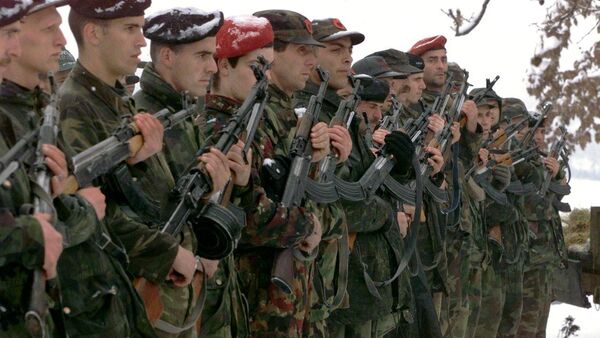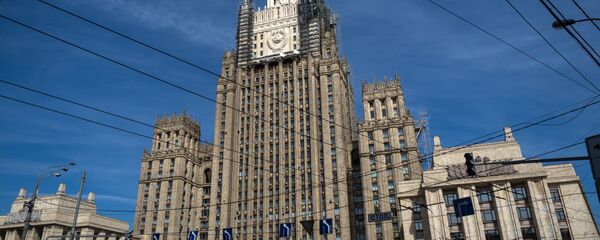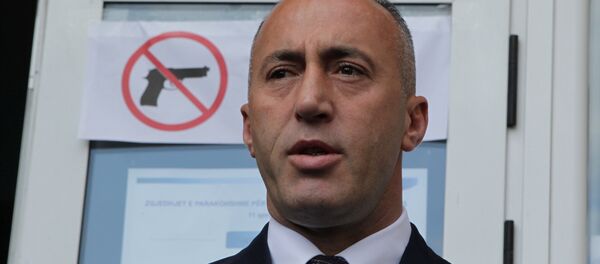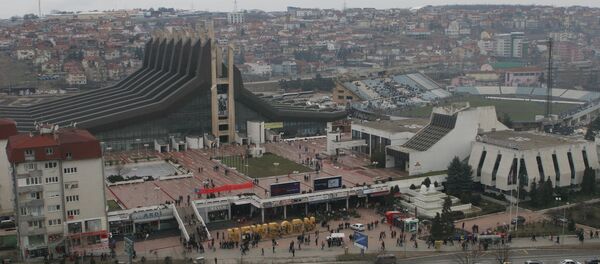A coalition led by the ruling center-right Democratic Party of Kosovo (PDK) won the elections in Kosovo, with the radical opposition Vetevendosje (Self-Determination) party coming second. The coalition will now have to find a partner to form a stable government.
Milivoje Mihajlovic, a journalist and executive director of Radio Belgrade, said that President Thaci, Ramush Haradinaj and their coalition partner, former KLA commander Fatmir Limaj, ought to be brought before the Hague Tribunal for the crimes committed by that terrorist organization.
“These people committed crimes. During the conflict in Kosovo civilians, both Serbs and Albanians, living in the areas under their control were killed, raped and their homes burned down. They deserve the Hague. On the other hand, the Self-Determination party is notorious for its radical rhetoric. Its leader, Kurti, says that he is for ‘a greater Albania,’ that international missions in Kosovo should be kicked out,” Mihajlovic told Sputnik Serbia.
“I guess this is the right time for [a party like] Self-Determination,” he added.
Kosovo Serbs
Several prominent Serbian political analysts Interviewed by Sputnik said that the current political makeup doesn’t bode well for the Kosovo’s minority Serbs.
The success of Srpska Lista party with close links to Belgrade, that managed to win all 10 seats reserved for Serbs in the 120-seat Kosovo legislature, is not enough to protect the Serbs’ interests in the breakaway region.
Belgrade University political scientist Stefan Surlic said that the Serbian MPs have found themselves in a real fix as they will have to deal with people who are wanted in Serbia on charges of committing war crimes.
“If the Kosovo Serb representatives refuse to cooperate they will be accused of obstructing the country’s system of governance,” Surlic told Sputnik Serbia.
“We are in a situation where coalition promises are being broken all the time. In Kosovo we have two parallel worlds. In one of them, the Serbs are fighting to have at least a semblance of an institutionalized system. Foreign ambassadors, above all the American one, will be playing a very big role in coalition games. They see Thaci and Haradinaj as their humble allies and the coalition around former Prime Minister Isa Mustafa as a holdover of Communist era,” Zivojin Rakocevic continued.
In his turn, Mihajlovic pointed out that the Kosovo Serbs took part in the elections to ensure a better life for the region’s Serbian minority, not to promote the creation of “an independent Kosovo.”
“We are going to see a lot of political horse-trading by Albanian partiers. The Serbian parties lean on Belgrade, which is now winning back its friends, including Russia and other allies,” Mihajlovic noted.
US and EU
The experts said they were also alarmed by the fact that extremist threats to drive the Serbs out of the region were being ignored by the West.
Milivoje Mihajlovic pointed out that while Hashim Thaci claims that the main problem is the Russian-Serbian humanitarian center in Nis and Russian MiGs, in reality, the biggest problem is that Brussels and Washington agree with him.
“What we have in Nis is a humanitarian, trouble-shooting center. As for the planes, they haven’t arrived yet, but we already have problems about this,” Milivoje Mihajlovic said.
“We will defend ourselves and explain that such insinuations are playing right into the hands of Pristina, which is trying to put on hold the investigation of the crimes committed by the Kosovo Liberation Army,” he emphasized.
On Wednesday, the Russian Foreign Ministry said that the outcome of the June 11, 2017 elections in Kosovo reflects the “radicalization of the political leadership in Pristina with the connivance of the EU and the United States.”
Kosovo unilaterally proclaimed independence from Serbia in 2008 and is recognized by over 100 UN member states. Serbia and Russia do not recognize Kosovo’s independence.






